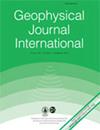Simultaneous Joint Inversion of Surface-Wave and Gravity Data for Revealing 3-D Crustal S-wave Velocity and Density Structures: A Case Study of the NE Tibetan Plateau
IF 2.8
3区 地球科学
Q2 GEOCHEMISTRY & GEOPHYSICS
引用次数: 0
Abstract
Summary Three-dimensional shear wave velocity and density models are important for understanding the structures, material composition, tectonic deformations, and dynamical mechanisms of the Earth's crust. Such models are usually based on surface-wave tomography and gravity inversion, which provide high resolution in the vertical and horizontal directions, respectively. The joint inversion of surface-wave and gravity methods can promote the mutual constraints and complementary advantages of seismic and gravity information, improving the imaging resolution and reducing the uncertainty in the individual methods. However, the traditional joint inversion methods directly construct only the shear wave velocity model, excluding density models. We present a joint inversion method of surface-wave and gravity data that simultaneously constructs both crustal shear wave velocity and density models. Unlike the previous studies, we reconfigure the seismic kernels of surface-wave tomography to preserve the seismic kernel of density. Moreover, the gravity kernel of density is combined with the seismic kernels to establish an objective function of simultaneous joint inversion. Consequently, the imaging resolution of density structure is improved. Our method is validated on the northeastern Tibetan plateau. The inversion results show that the Dingxi, Jiuzhaigou, and Jishishan earthquakes occurred in the high–low anomaly transition zones of shear wave velocity or density, implying that they were induced by accumulation of strain energy in the upper crust of the northeastern Tibetan plateau when the surrounding harder blocks extruded during the tectonic deformation process.揭示三维地壳 S 波速度和密度结构的面波和重力数据同步联合反演:青藏高原东北部案例研究
摘要 三维剪切波速度和密度模型对于了解地壳结构、物质组成、构造变形和动力学机制非常重要。这类模型通常基于面波层析成像和重力反演,分别提供垂直和水平方向的高分辨率。面波和重力方法的联合反演可以促进地震和重力信息的相互制约和优势互补,提高成像分辨率,降低单个方法的不确定性。然而,传统的联合反演方法仅直接构建剪切波速度模型,不包括密度模型。我们提出了一种同时构建地壳剪切波速度和密度模型的地表波和重力数据联合反演方法。与以往的研究不同,我们重新配置了面波层析成像的地震核,保留了密度地震核。此外,密度重力核与地震核相结合,建立了同步联合反演的目标函数。因此,密度结构的成像分辨率得到了提高。我们的方法在青藏高原东北部得到了验证。反演结果表明,定西、九寨沟和积石山地震发生在剪切波速度或密度的高低异常过渡带,这意味着这些地震是在构造变形过程中,周围较坚硬的块体挤压青藏高原上部地壳应变能量积累诱发的。
本文章由计算机程序翻译,如有差异,请以英文原文为准。
求助全文
约1分钟内获得全文
求助全文
来源期刊

Geophysical Journal International
地学-地球化学与地球物理
CiteScore
5.40
自引率
10.70%
发文量
436
审稿时长
3.3 months
期刊介绍:
Geophysical Journal International publishes top quality research papers, express letters, invited review papers and book reviews on all aspects of theoretical, computational, applied and observational geophysics.
 求助内容:
求助内容: 应助结果提醒方式:
应助结果提醒方式:


